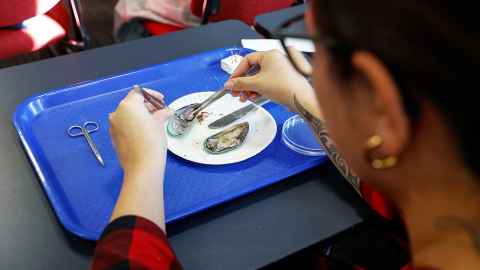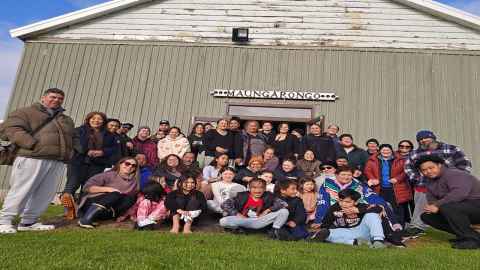Mātauranga at heart of doctoral candidate’s research
18 September 2025
PhD researcher Sarah Rewi focuses on groundwater-dependent ecosystems in Aotearoa, with mātauranga Māori at the centre.

Researcher Sarah Rewi (Faculty of Science) is leading a new wave of Māori-led ecological research that centres whānau, whenua and whakapapa at Waipapa Taumata Rau, University of Auckland.
Sarah (Ngāi Tāhuhu, Ngāpuhi) says her research is grounded in mātauranga and driven by a deep commitment to community aspirations, data sovereignty and environmental justice.
She presented at the University’s Pūtaiao Research Symposium held 4-5 September at NorthTec Tai Tokerau Wananga. The symposium enabled talks about different aspects of taonga; from the environment to whakapapa, to communication, sustainability, all celebrating Māori in a Māori space.
‘The mighty mussel’ demonstrated the special properties of the popular bivalve delicacy through the species' ability to clean up waterways. Sarah says it was great to see that those who came along were fascinated.
Sarah’s research focuses on groundwater-dependent ecosystems, particularly the role of native plants like watercress and tī kōuka in mitigating heavy metal contamination in freshwater springs. Her kaupapa is clear: to reframe science through a Māori lens, where mātauranga is the tuākana (elder sibling) and Western science the teina (younger sibling).
“Mātauranga is the tuākana; science is the teina. Our knowledge systems were here first.”
My father always said, ‘Take these skills home to our people.’ That’s what drives me.

Although she grew up in Tāmaki Makaurau, her journey into research was shaped by her strong connection to Poroti, Northland, that sits atop of one of the country’s largest aquifers.
Her father, the late Dr Martin Davis, was a trailblazer in Māori health. The first in his family to attend university, he entered medical school at 42, dedicating his career to improving outcomes for Māori, particularly in renal and cardiovascular care.
He worked at Papakura Marae, where he helped establish emergency dialysis services and advocated for lowering bowel cancer screening ages for Māori.
Her mother, Jocelyn Davis, was also the first on her side of the family to attend university, studying psychology and working alongside her husband. Together, they instilled in Sarah a belief in education as a pathway out of poverty and a tool for collective uplift.
“My father always said, ‘Take these skills home to our people.’ That’s what drives me.”
After completing a Bachelor of Science and a Bachelor of Arts, Sarah sought a research path that would allow her to explore both ecology and kaupapa Māori.
A project on muttonbird harvesting, supervised by Dr Brendon Dunphy and Dr Dan Hikuroa, gave her the freedom to shape the research in a way that honoured her values. Through this work, she reconnected with her Te Kawerau ā Maki whānau, forming a relationship that became central to her research.
“I ended up working with whānau, I was chatting with one of my kaumātua up home, he was like, ‘you’re working where, oh your great-grandmother is from Te Kawerau ā maki,” says Sarah.
Her approach is relational, respectful and revolutionary.
“I won’t work on your whenua without your consent,” she told them. “This research is going ahead, but not without you.”

She has published in international journals, including the International Journal for Environmental Research and Public Health with a paper with Dan Hikuroa 'He Karanga Maha: Investigating Relational Resource Management in Aotearoa', and continues to advocate for Indigenous-led solutions to climate change and environmental degradation.
Sarah’s work challenges the dichotomy between mātauranga and science. She argues that Indigenous knowledge systems are not supplementary but foundational, and that research must be community-led, solution-focused, and grounded in whakapapa.
“We’re not passive victims of climate change – we are where the solutions lie,” she says.
Now halfway through her PhD, Sarah is working to establish formal partnerships between the University and iwi, ensuring that Māori communities have a say in who accesses their lands and how research is conducted. Her vision is for a future where Māori are not just participants in science but leaders, decision-makers and protectors of their own knowledge and resources.
“Everything I publish, I take back to my whānau. I ask for their blessing. That’s the bare minimum of respect.”
She says her focus on the brilliance and aroha of community is a reminder of her belief that the future of science in Aotearoa is not only Indigenous - it is relational, restorative and innovative.